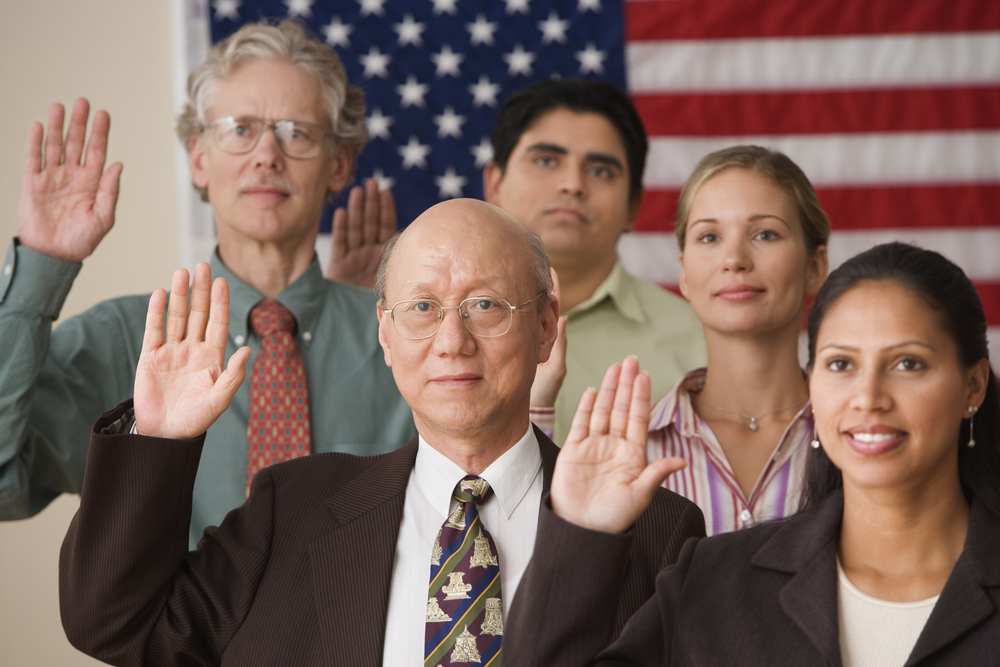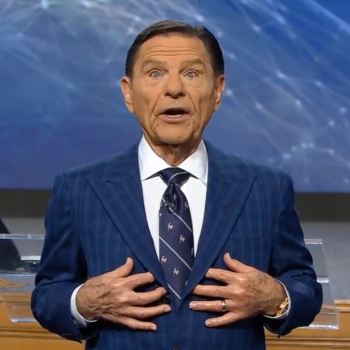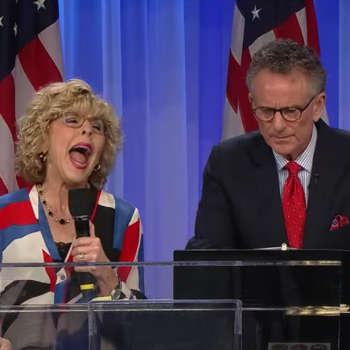The Naturalization Oath of Allegiance to the United States of America — the oath you take when you become a new citizen — will continue ending with the words “so help me God,” after an unsuccessful legal challenge to its constitutionality.
Earlier today, the Supreme Court denied hearing the case, leaving in place a 2018 decision that said the phrase was fine.

The story involved Olga Paule Perrier-Bilbo, who filed a federal lawsuit against the United States (including the director of the office of Citizenship and Immigration Services) in 2017. Perrier-Bilbo, a French citizen, has lived in Massachusetts since 2000 and wanted to become an official U.S. citizen. Her application was approved and the oath was the only thing standing in her way. Because she’s an atheist, though, she said she could not “in good conscience include those words in her oath.”
The government told her she had two alternatives: She could say the oath but just remain silent during the “so help me God” part, or she could take a modified version of the oath that didn’t include the religious phrase at all.
She said neither option was acceptable because the first still included the religious phrase (and wasn’t that a problem?) and the second took a separate-but-equal approach to the oath. Either way, the government was establishing theism as the default.
This is unfair, demeaning and improper. Plaintiff is unwilling to start her new life as an American citizen in some second-class status solely because she chooses to follow her religious precepts. Under the principles of equal protection, she demands the right to experience the elation, the pride, the sense of camaraderie, and the sense of belonging, which comes from joining her fellow new citizens as an equal participant in the naturalization oath ceremony.
The argument wasn’t all that outlandish on the surface. Why wasn’t the religious oath the one you had to specially request? Shouldn’t the default version be secular?
Legally speaking, though, she had to prove that the oath was an unreasonable burden on her (ir)religious beliefs or that it was unconstitutional by itself and that she had standing to challenge it. It was a long shot. Which may be why her attorney was Michael Newdow, the atheist who famously declared to the Supreme Court that the Pledge of Allegiance was unconstitutional because of the words “Under God” and who tried to remove “In God We Trust” from our currency. (He lacked standing in the “Under God” case, and he’s been unsuccessful with the currency challenges.)
In 2018, a judge ruled against Newdow and Perrier-Bilbo, saying that the naturalization oath wasn’t some government establishment of religion and saying it (or the modified versions) wasn’t a burden on Perrier-Bilbo’s beliefs. U.S. District Judge William Young said in his ruling that while Perrier-Bilbo had proper standing, her arguments weren’t convincing.
Was the phrase “so help me God” a violation of the Establishment Clause? No, Young said, because it was ceremonial and a “well-established tradition.”
Was the government compelling her to violate her religious beliefs? No, Young said, because she had reasonable alternatives.
Was the oath’s religious message a burden on her beliefs? No, Young said, and he didn’t hold back on why he believed this wasn’t a violation of the Religious Freedom Restoration Act (RFRA):
In light of the two options afforded to Perrier-Bilbo, this Court cannot hold that the government conduct here imposes “substantial pressure” on her to violate her beliefs. While Perrier-Bilbo may subjectively consider it burdensome either to omit the phrase or to request a private ceremony, not every minor imposition rises to the level of a substantial burden, the existence of which is a purely legal issue for the Court.
Was the oath a violation of the Equal Protection Clause? No, Young said, because she wasn’t treated any differently because of her beliefs, nor were religious oath-takers given preferential treatment.
Did the oath violate her Due Process rights? No, Young said, because the government wasn’t asking her to do anything she didn’t want to do. She had options.
She eventually appealed the case to the U.S. Court of Appeals for the First Circuit, and that decision was released in April. The judges — including two Obama appointees — even cited the American Humanist Association’s recent Supreme Court case to uphold the earlier ruling:
We follow the Supreme Court’s most recent framework and apply American Legion‘s presumption of constitutionality to the phrase “so help me God” in the naturalization oath because we consider the inclusion of similar words to be a ceremonial, longstanding practice as an optional means of completing an oath.
Ultimately, they cited four reasons for dismissing the challenge on Establishment Clause claims: The oath was tradition, the meaning of “so help me God” has evolved over time (so it’s become less religious over the years), there’s an alternative (secular) oath anyone can use, and — this is the most controversial one — removing the phrase would be seen as “aggressively hostile to religion.”
In other words, Christian Nationalism is so entrenched in our culture, that government neutrality on religion could now be seen as anti-Christian.
And now the U.S. Supreme Court won’t hear an appeal.
So for the time being, Perrier-Bilbo is not a citizen… but she can be. The ruling wasn’t unexpected, but it further hardens the idea that religious phrases shouldn’t be treated as religious at all. This is the mindset that allows state legislatures to pass bills requiring public schools to post “In God We Trust” signs in the buildings, and permits schools to recite the religious Pledge, and urges officials or jurors to swear their oaths on the Bible (as a default). We’re so used to it by now that the government doesn’t treat these things as a promotion of Christianity — even though if those options were even taken away, Christians would be the first to argue that the government is punishing their faith.
(Image via Shutterstock. Large portions of this article were published earlier)




It’s Moving Day for the Friendly ..."
It’s Moving Day for the Friendly ..."
It’s Moving Day for the Friendly ..."
It’s Moving Day for the Friendly ..."